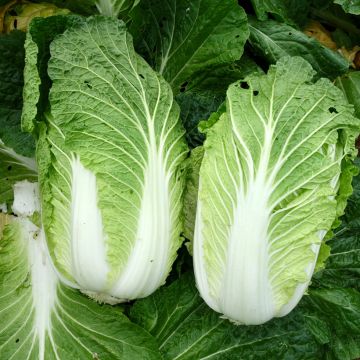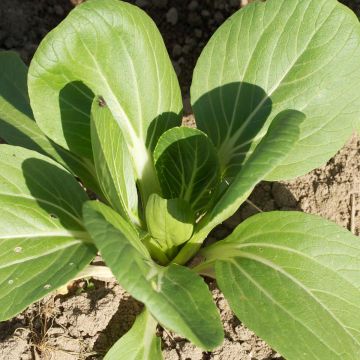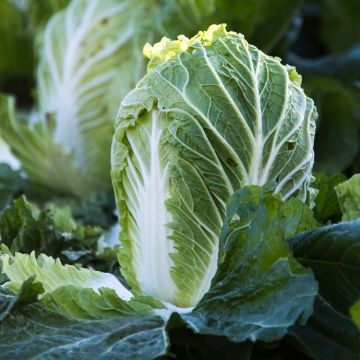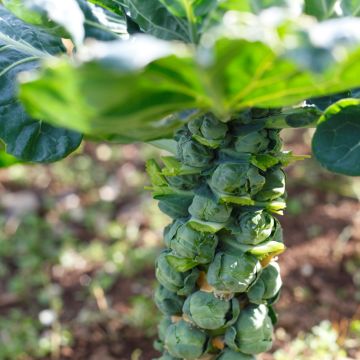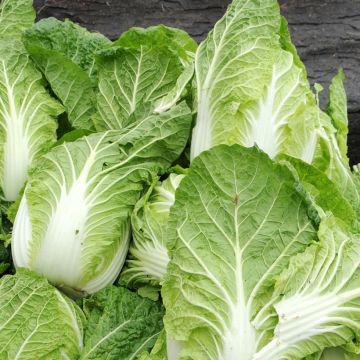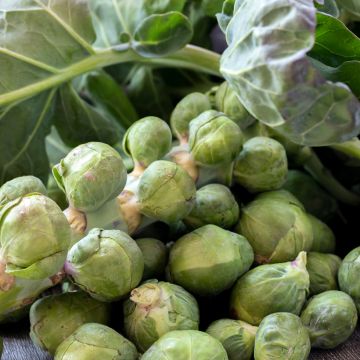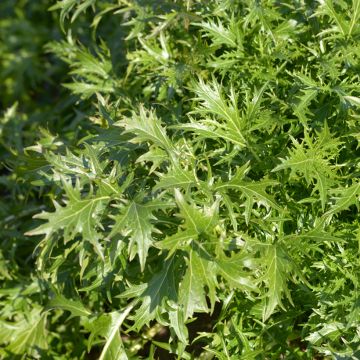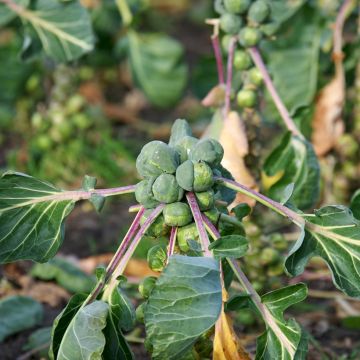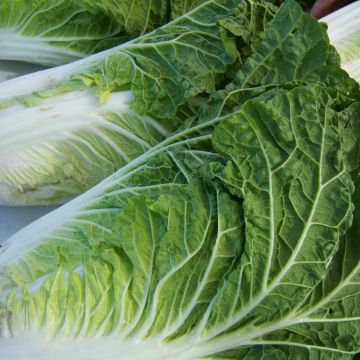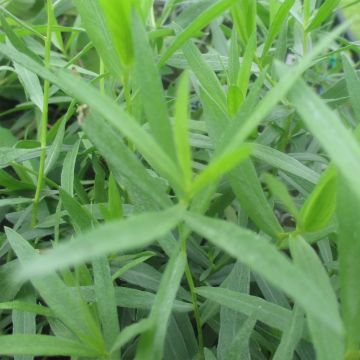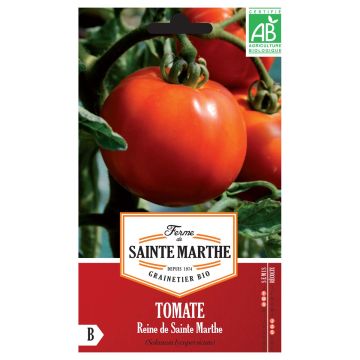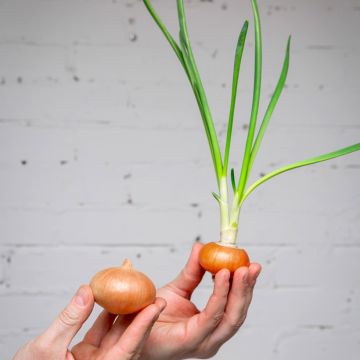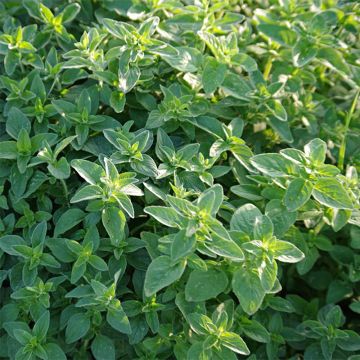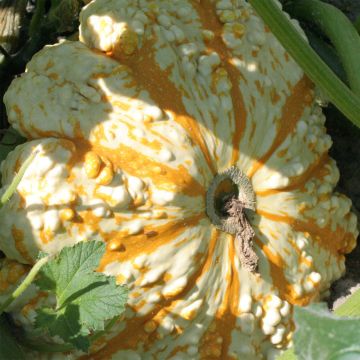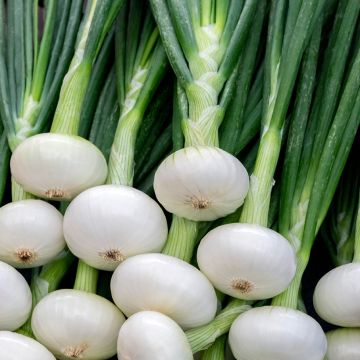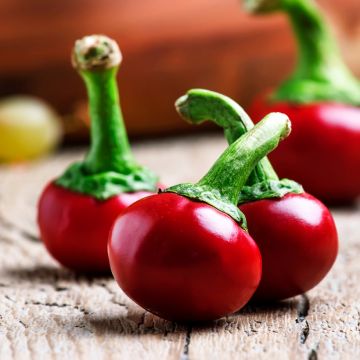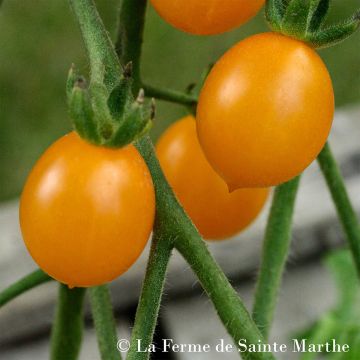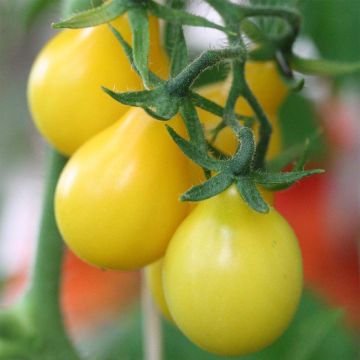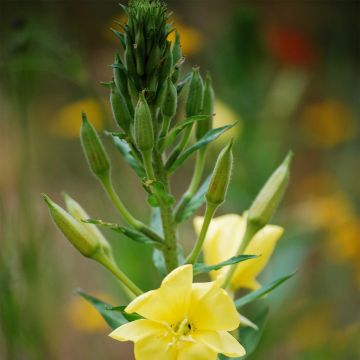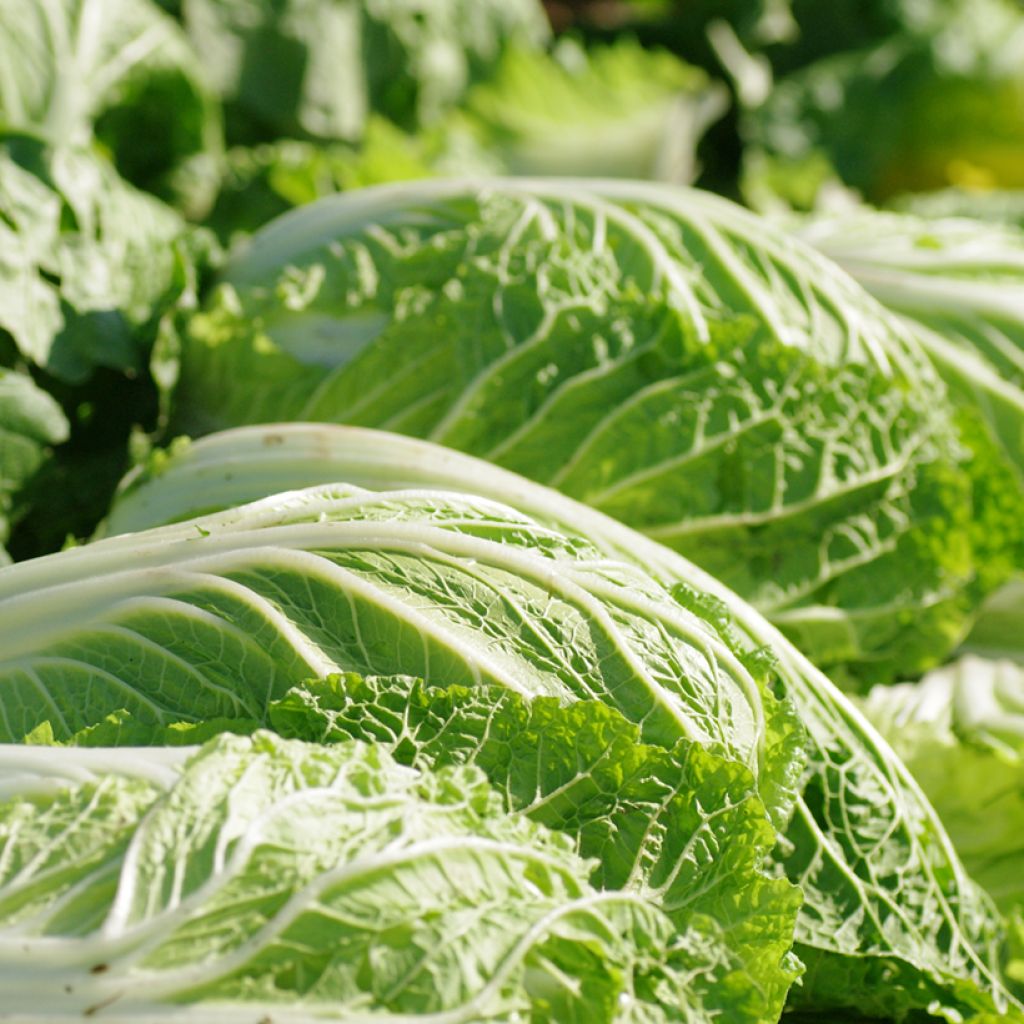

Napa Cabbage Chorus F1 - Pe-Tsai
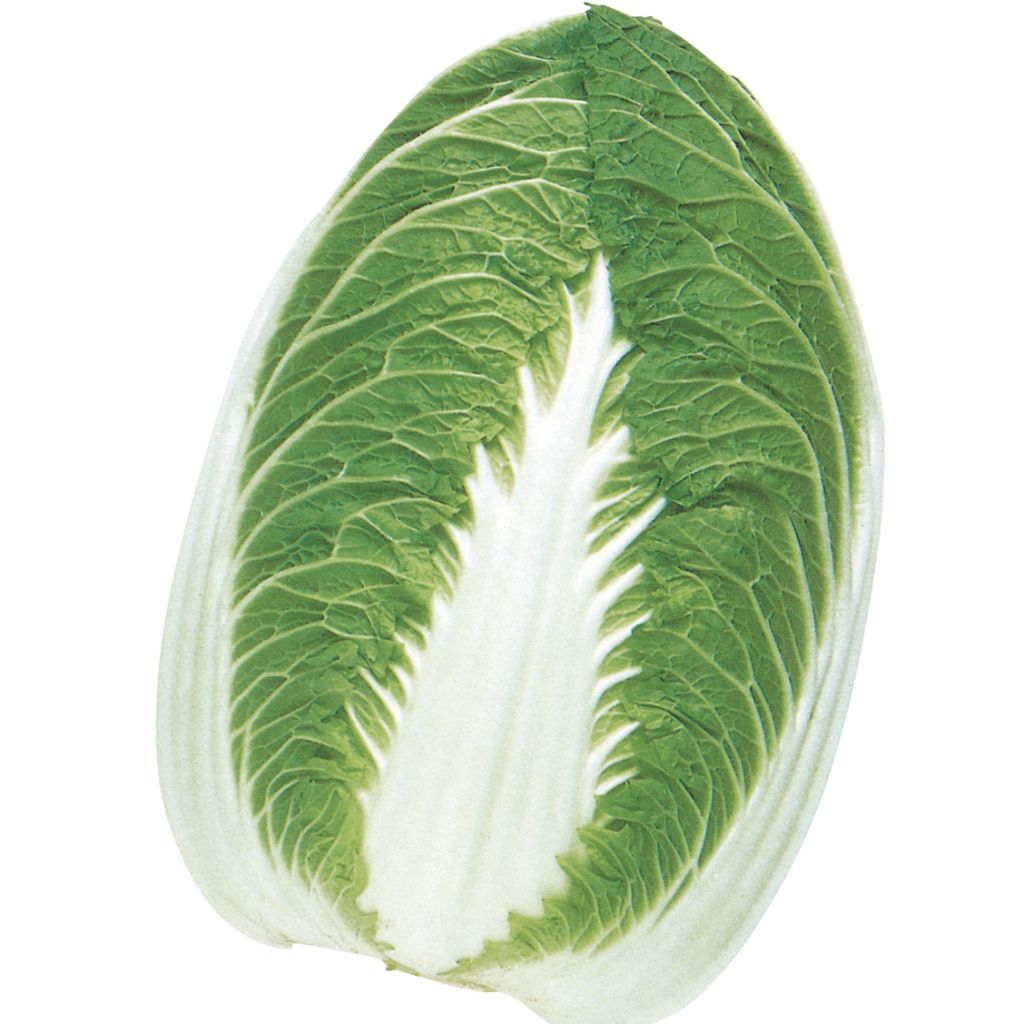

Napa Cabbage Chorus F1 - Pe-Tsai
Napa Cabbage Chorus F1 - Pe-Tsai
Brassica rapa pekinensis Pe-Tsai Chorus F1
Chinese cabbage
Why not try an alternative variety in stock?
View all →This plant carries a 6 months recovery warranty
More information
We guarantee the quality of our plants for a full growing cycle, and will replace at our expense any plant that fails to recover under normal climatic and planting conditions.
Seed-only orders are dispatched by sealed envelope. The delivery charge for seed-only orders is €3.90.
Delivery to Corse prohibited: UE law prohibits the import of this plant from mainland France to Corse as part of the fight against Xylella fastidiosa. Please accept our sincere apologies.
More information
Description
Napa cabbage 'Chorus F1' is an early-maturing hybrid variety that forms compact, densely-packed elongated heads that weigh up to 2 kg. The light green wavy, crinkled leaves have large ribs and a delicate flavour that is milder than green cabbage. A hardy variety that is particularly resistant to clubroot. Sow from mid-June to mid-August and harvest from late August to late October.
Chinese cabbage (Brassica rapa) is a leaf vegetable belonging to the large Brassicaceae family. It is native to East Asia. It is a staple in Asian cuisine and has become increasingly popular in western countries since the 19th century. The two most common subspecies are napa cabbage (Pekinensis Group) and bok choy (Chinensis group). Napa cabbage, also known as Chinese white cabbage, pe-tsai and “celery cabbage”, produces tall, oblong heads of pale green leaves white thick white ribs. Bok choy or pak choi is doesn’t form heads but lightly-packed clusters of fleshy stalks, topped with dark to medium green leaves. Chinese cabbage is a versatile vegetable that is delicious eaten raw in salads as well as cooked in a stir-fry or a stew. This biennial plant, grown as an annual, is remarkably healthy thanks to its high vitamin A, K and C content. It is also a good source of fibre and minerals such as calcium and potassium.
Chinese cabbage is slightly trickier to grow than regular green cabbage as it tends to bolt easily in hot weather and is not very cold hardy. It is an ideal crop for late summer and early autumn, before the frost sets in. In cooler regions, it is possible to grow Chinese cabbage as a winter crop. It requires deep, rich soil, regular watering and plenty of sun.
Harvest: Either harvest the leaves as and when required or wait until the heads are fully formed and cut them off at ground level.
Storage: Chinese cabbage will keep for several days in the refrigerator.
Good to know: Mulching with grass clippings or dead leaves will help keep the soil moist whilst limiting weed growth.
Even if the vegetable garden is first and foremost a place for growing great quality veg, it’s always a good idea to leave a bit of room for flowers. Growing flowers alongside your vegetable plants will make your general gardening experience more enjoyable and is a great way to attract pollinators and repel garden pests! Flowers such as gaillardia, marigolds, zinnias, cosmos or nasturtiums can be sown in and around the rows of vegetables. Herbs such as dill can be very useful also. Bear in mind that some companion plants self-seed easily and can be a bit invasive (borage, chives, lemon balm etc.)
NB: This variety is marked F1 for "F1 hybrid" meaning that its qualities are derived from carefully selected parent plants. This results in a variety that is both full of flavour and resistant to diseases. Sometimes criticized or wrongly assimilated to GMOs, F1 hybrid seeds have the advantage of producing reliable, uniform, disease resistant plants. Unfortunately, these qualities will not be passed on to following generations.
Report an error about the product description
Harvest
Plant habit
Foliage
Botanical data
Brassica
rapa
pekinensis Pe-Tsai Chorus F1
Brassicaceae
Chinese cabbage
Cultivar or hybrid
Annual
Other Chinese cabbage seeds
Planting and care
Sowing:
The germination temperature of Chinese Cabbage Pe-Tsai Chorus F1 is around 20°C and takes about 14 days.
It can be sown from mid-June to mid-August for a harvest from late August to late October.
You can either directly sow the seeds in the ground or prepare seedlings that will later be transplanted to their final position in the garden.
Preparing Seedlings: Under shelter or in a nursery in the garden for the rest of the year (depending on the recommended sowing period), sow the seeds at a depth of 1 to 2 cm in good seed compost or fine soil. Lightly cover with compost and remember to keep the substrate moist but not waterlogged.
When the young plants are strong enough to be handled, transplant them into pots if necessary before planting them in the garden, when there is no longer any risk of frost. When planting, respect the recommended spacing for direct sowing.
Direct Sowing: In well-amended and finely worked soil, create furrows about 1 or 2 centimeters deep, spaced 40 centimeters apart. Sow the seeds and cover them with a thin layer of fine soil. When the seedlings are well developed, thin them out, leaving one plant every approximately 40 cm.
Cultivation:
Chinese Cabbage grows best in full sun. It is a nutrient-demanding vegetable that requires well-rotted, nitrogen- and potassium-rich soil. It is advisable to apply a generous amount of mature compost (about 3/4 kg per m2) in autumn by raking it into the soil to a depth of 5 cm, after having loosened the soil as is done for all vegetable crops. It is not very tolerant of soil pH and prefers it to be between 5.6 and 6.5. In acidic soil, it is necessary to gradually raise the pH by adding calcium in the form of Dolomite or Lime.
Beware of pests such as Cabbage White Butterfly or Flea Beetles and consider using insect netting.
Seedlings
Care
Intended location
This item has not been reviewed yet - be the first to leave a review about it.
Vegetable seeds
Haven't found what you were looking for?
Hardiness is the lowest winter temperature a plant can endure without suffering serious damage or even dying. However, hardiness is affected by location (a sheltered area, such as a patio), protection (winter cover) and soil type (hardiness is improved by well-drained soil).

Photo Sharing Terms & Conditions
In order to encourage gardeners to interact and share their experiences, Promesse de fleurs offers various media enabling content to be uploaded onto its Site - in particular via the ‘Photo sharing’ module.
The User agrees to refrain from:
- Posting any content that is illegal, prejudicial, insulting, racist, inciteful to hatred, revisionist, contrary to public decency, that infringes on privacy or on the privacy rights of third parties, in particular the publicity rights of persons and goods, intellectual property rights, or the right to privacy.
- Submitting content on behalf of a third party;
- Impersonate the identity of a third party and/or publish any personal information about a third party;
In general, the User undertakes to refrain from any unethical behaviour.
All Content (in particular text, comments, files, images, photos, videos, creative works, etc.), which may be subject to property or intellectual property rights, image or other private rights, shall remain the property of the User, subject to the limited rights granted by the terms of the licence granted by Promesse de fleurs as stated below. Users are at liberty to publish or not to publish such Content on the Site, notably via the ‘Photo Sharing’ facility, and accept that this Content shall be made public and freely accessible, notably on the Internet.
Users further acknowledge, undertake to have ,and guarantee that they hold all necessary rights and permissions to publish such material on the Site, in particular with regard to the legislation in force pertaining to any privacy, property, intellectual property, image, or contractual rights, or rights of any other nature. By publishing such Content on the Site, Users acknowledge accepting full liability as publishers of the Content within the meaning of the law, and grant Promesse de fleurs, free of charge, an inclusive, worldwide licence for the said Content for the entire duration of its publication, including all reproduction, representation, up/downloading, displaying, performing, transmission, and storage rights.
Users also grant permission for their name to be linked to the Content and accept that this link may not always be made available.
By engaging in posting material, Users consent to their Content becoming automatically accessible on the Internet, in particular on other sites and/or blogs and/or web pages of the Promesse de fleurs site, including in particular social pages and the Promesse de fleurs catalogue.
Users may secure the removal of entrusted content free of charge by issuing a simple request via our contact form.
The flowering period indicated on our website applies to countries and regions located in USDA zone 8 (France, the United Kingdom, Ireland, the Netherlands, etc.)
It will vary according to where you live:
- In zones 9 to 10 (Italy, Spain, Greece, etc.), flowering will occur about 2 to 4 weeks earlier.
- In zones 6 to 7 (Germany, Poland, Slovenia, and lower mountainous regions), flowering will be delayed by 2 to 3 weeks.
- In zone 5 (Central Europe, Scandinavia), blooming will be delayed by 3 to 5 weeks.
In temperate climates, pruning of spring-flowering shrubs (forsythia, spireas, etc.) should be done just after flowering.
Pruning of summer-flowering shrubs (Indian Lilac, Perovskia, etc.) can be done in winter or spring.
In cold regions as well as with frost-sensitive plants, avoid pruning too early when severe frosts may still occur.
The planting period indicated on our website applies to countries and regions located in USDA zone 8 (France, United Kingdom, Ireland, Netherlands).
It will vary according to where you live:
- In Mediterranean zones (Marseille, Madrid, Milan, etc.), autumn and winter are the best planting periods.
- In continental zones (Strasbourg, Munich, Vienna, etc.), delay planting by 2 to 3 weeks in spring and bring it forward by 2 to 4 weeks in autumn.
- In mountainous regions (the Alps, Pyrenees, Carpathians, etc.), it is best to plant in late spring (May-June) or late summer (August-September).
The harvesting period indicated on our website applies to countries and regions in USDA zone 8 (France, England, Ireland, the Netherlands).
In colder areas (Scandinavia, Poland, Austria...) fruit and vegetable harvests are likely to be delayed by 3-4 weeks.
In warmer areas (Italy, Spain, Greece, etc.), harvesting will probably take place earlier, depending on weather conditions.
The sowing periods indicated on our website apply to countries and regions within USDA Zone 8 (France, UK, Ireland, Netherlands).
In colder areas (Scandinavia, Poland, Austria...), delay any outdoor sowing by 3-4 weeks, or sow under glass.
In warmer climes (Italy, Spain, Greece, etc.), bring outdoor sowing forward by a few weeks.

































